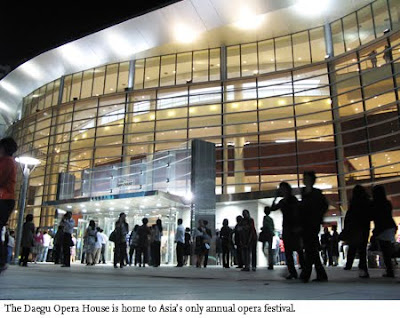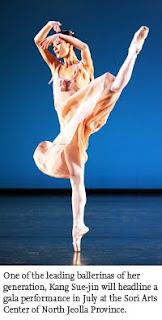
Performing arts flourishes outside the Seoul City:
Some concert venues outside Seoul are increasingly staging high-quality performances, reflecting the zeal of localities to upgrade their cultural profile.
Seoul has traditionally been the center of most things in the nation including performing arts. It is now, however, safe to say that one no longer has to be a resident in the capital to hear renowned musicians, orchestras or see famous productions of musicals and ballets in their own backyard.
Particularly since the early 2000s, large-scale performing arts centers like the Goyang Aramnuri Complex in Gyeonggi Province and ones in Daegu have been built to expand the cultural horizons of citizens outside Seoul.
As a result, the cultural gap between the capital and the provinces has consistently been closing, with some production companies and artists choosing to premiere or perform solely in regional areas.

Gyeongsang region
The southeastern city of Daegu is one of the larger cities leading the regional movement to elevate their cultural status.
Its distinction as the manufacturing and commercial center of Korea has been fading over the years, but cultural rebranding has been more successful than in other areas, particularly with events like the annual Daegu International Opera Festival.

Since its inception in 2003, it has gained prestige as the only opera festival in Asia, having collaborated with outstanding opera companies from around the world.
In addition to the Daegu Opera House, the home of the said festival, the city of 2.5 million houses several performing venues like the Keimyung Art Center.
Popular French musical “Mozart, l’Opera Rock” will make its local premiere at the Keimyung Art Center next month.

The popular production will be staged from Feb. 14 to March 11. The plot revolves around the conflict between genius Austrian composer Wolfgang Amadeus Mozart and his Italian rival Antonio Salieri. It combines Mozart’s classical pieces such as Symphony No. 40 and Piano Concerto No. 23 with modern rock music. After performances in Daegu, the production will move to the Seongnam Arts Center in Seongnam, Gyeonggi Province, in March.
“We decided to stage the ‘Mozart, l’Opera Rock’ in Daegu because the city is becoming a new cultural center of Korea,” Seo Myung-wook, producer of the musical, said in a statement. “It is renowned as a city of musicals as the host of the Daegu Musical Festival which celebrated its 5th year in 2011.”
Another big event for the center is the concert “12 Cellists of the Berlin Philharmonic” in July. The ensemble is composed of the cello section from the one of the world’s most respected orchestras and will perform at the center on July 8.
Busan’s best example of a cultural surge can be found in places like the Eulsukdo Cultural Center, founded in 2002.
Although only 10 years old and not as spacious as some other facilities in the city, it has gained recognition for hosting performances by world-famous musicians like violinist Sarah Chang and pianist Paik Kun-woo.
The Eulsukdo Cultural Center consists of diverse cultural and artistic spaces, including a theater for plays, dance, and music recitals, an exhibition hall, a cultural lecture hall, an outdoor theater for festival-style performances, and various hobby classes. It was selected as the nation’s best regional culture center in 2010 by the Ministry of Culture, Sports and Tourism.
The center has improved the cultural level of the west Busan region, which is somewhat lagging in cultural activities compared to the city’s southern region near the major tourist site of Haeundae Beach.
The nation’s industrial centers also run large-scale complexes which have previously hosted recitals of masters like violinist Chung Kyung-wha.
Jeolla region
North Jeolla Province is expected to be one of the most culturally active regions this year in light of the Yeosu Expo from May 12 to Aug. 12 in the southwestern port city.
Yeosu is expecting around 8 million visitors during the 90-day event and high-level cultural activities are planned to promote the town lacking global appeal compared to past hosts of the event such as New York, Shanghai, Montreal, Vancouver and Osaka.
The culture ministry is conducting a tourism campaign particularly designed to promote the region under the slogan “Visit North Jeolla Year 2012.”
A highly-anticipated event is a rare visit to Korea by I Musici, an Italian chamber orchestra from Rome formed in 1952 and one of the most respected ensembles in this genre worldwide. They are well known for their interpretations of Baroque works, particularly by Antonio Vivaldi and Tomaso Albinoni. The group will perform on June 23 at the Sori Arts Center of North Jeolla Province.
The center will also hold performances by Korea’s most famous ballerina Kang Sue-jin of Germany’s Stuttgart Ballet in July and recitals by famous artists such as pianist Lim Dong-hyek.
Arts centers in the region will also stage various “gukak,” or traditional Korean music, performances to promote the area’s long history of “pansori” (Korean opera).
To shed its image as a cultural underdog in the nation, South Jeolla Province is currently building what it calls the “Lincoln Center of Gwangju.”
Since 2004, the culture ministry and the city of Gwangju have been working together for the Asian Culture Complex, one of the largest cultural projects in the country’s history.
Gyeonggi & Gangwon provinces
The best-known cultural facility here is the Goyang Aramnuri Cultural Complex, considered to be on par with those in Seoul. Pianist Paik Kun-woo held a rare all-Liszt program there last year and singer Lee Mi-ja will hold a recital on Feb. 5.
Smaller provinces like Gangwon used to have a distinct lack of cultural activities but it is now home to the best chamber music festival in the country. The 9th Great Mountains International Music Festival & School led by violinist Chung Kyung-wha will take place for two weeks in August at the Alpensia Concert Hall.

No comments:
Post a Comment